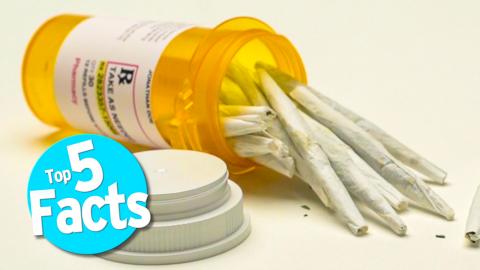Top 5 Facts About Legalizing Drugs

The future may be looking bright for drug users… but major obstacles still stand between them and that legal high. Welcome to WatchMojo's Top 5 Facts.
In today's instalment, we're counting down the top five facts about legalizing drugs. The states of Colorado, Alaska, Oregon and Maine have joined the likes of Colombia and Uruguay by legalizing marijuana for recreational use. Portugal has decriminalized all drugs. It seems like the “war on drugs” may finally be coming to an end... but in reality, various narcotics, including marijuana, still face major challenges on the road legalization.
Special thanks to our user Daniel Fong for submitting the idea on our interactive suggestion tool: WatchMojo.comsuggest
#5: Overcoming the Social Stigma Is Key to Changing Drug Laws
“Drugs are bad.” It’s something kids learn at a young age, alongside such other sayings like “just say no,” “don’t ya put it in your mouth,” and “if you do drugs you’ll ruin your life and die alone.” In our society, the stigma against drugs runs deep. Since the 1930s, every generation has been hit with educational material like this. The propaganda has even produced some real classics, like the 1936 film “Reefer Madness”. It’s incredibly hard to change a dialogue nearly a century in the making. A drink after work is a time-honored American tradition. A joint? Deviant behavior. In order to overhaul drug legislation, serious public support is needed, and many voters refuse to question their views on the topic. Others… do seem more open-minded.
#4: Pharmaceutical Companies Would Lose Big
When a company develops a new drug, it gets patented. That 20-year patent allows pharmaceutical companies to control the pricing of their product and make a killing in the process. But how do you corner the market on a plant? Yes, companies can get in on the production and distribution, but the pharmaceutical industry loses the ability to establish a monopoly. Their biggest concern? Marijuana has proven to be a highly effective alternative medicine for a number of conditions including Parkinson's, epilepsy, glaucoma and chronic pain. The drugs currently sold to address those illnesses are often prohibitively expensive (which translates to… super profitable). But they become worthless if people can get results with marijuana. It's not just big-pharma either, as the alcohol industry is also dropping loads of money to fight legalization.
#3: International Treaties Would Need to be Amended
Part of the platform that won the Canadian Liberal Party the 2015 federal election was the promise to legalize marijuana. But it’s easier said than done. Several states in the U.S. have legalized pot, but since it isn’t legal at the federal level, the country hasn’t had to face the international community. While one might argue that marijuana is becoming increasingly de-stigmatized on a global scale, the fact remains that both Canada and the United States have signed a number of international treaties that are in direct conflict with their legalization efforts. Such treaties include “The Single Convention on Narcotic Drugs of 1961” and “The Convention on Psychotropic Substances of 1971.” Amending their commitment to these treaties is possible... but it will be far from simple.
#2: Drugs Result in Arrests... and the Prison System is Big Business
According to a report from the National Research Council, the United States holds 25% of the world’s inmates. That’s a terrifying figure, considering that the U.S. only accounts for 5% of the world’s total population. When the war on drugs began, the prison population exploded. According to the Federal Bureau of Prisons, roughly 46% of inmates are there for drug charges. Over 700,000 arrests are made yearly in America, just for marijuana. If the United States were to decriminalize marijuana, or following Portugal’s example with all drugs, prisons would suddenly feel very empty. And that’d be bad for business. Sure, the U.S. has promised to end privatized prisons, but prison work programs remain the only “acceptable” source of nearly-free labor. Get rid of drug crimes, and that modern slave labor goes away.
#1: It Would Majorly Disrupt Law Enforcement
It’s never easy admitting that you were wrong. But when you’ve been fighting a losing and literal war on something for decades… it becomes nearly impossible to turn around and acknowledge that it was colossal waste of time and money. That being said, pride is far from the biggest motivator behind law enforcement’s opposition to legalization. Legalization of narcotics would involve serious restructuring of various agencies, and a fundamental shift in the way policing is done. For many departments, property, assets and cash seized during drug busts have become an essential source of revenue. Additionally, anti-marijuana lobbyists secure funding on behalf of police departments each year to keep the war going. Long story short, the war on drugs has kept officers employed... and entire police departments in the green for years.
